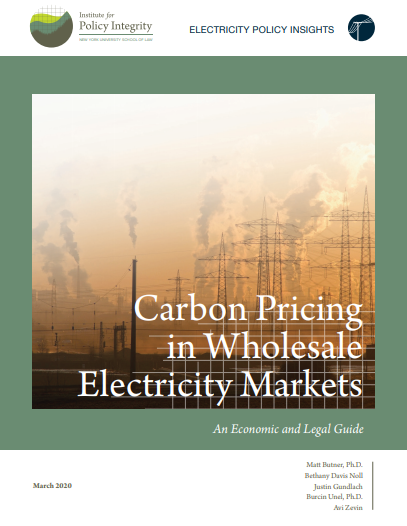-
Key Economic Errors in the Clean Car Standards Rollback
The federal Clean Car Standards promised steadily increasing fuel efficiency and lower vehicle emissions. The National Highway Traffic Safety Administration and the Environmental Protection Agency have now rolled back those standards, eviscerating important public health benefits and fuel savings for consumers. But the agencies’ own analysis shows that the rollback will cause more harm than good for society. And even the slight benefits that the agencies find under certain assumptions are premised on a flawed economic analysis that is riddled with problems.
We released a resource that explains the main economic problems with the rollback’s justification, identifying several critical errors and detailing how they invalidate the agencies' own claims
-
Carbon Pricing in Wholesale Electricity Markets
An Economic and Legal Guide
This report explains how carbon-pricing rules in organized wholesale electricity markets can improve economic efficiency. It then explores the economic principles and legal requirements for RTOs, states, and the Federal Energy Regulatory Commission to consider when implementing a carbon-pricing rule in organized wholesale electricity markets. And it identifies several policy-design approaches that, to varying degrees, meet those economic principles and are likely to be found legally permissible.
-
Comments to EPA on Federal Emissions Management from Oil and Gas Sources in Utah
The Environmental Protection Agency’s (EPA) Federal Implementation Plan (FIP) for managing emissions on the Uintah and Ouray Indian Reservation in Utah proposes control requirements for new, modified, and existing oil and natural gas sources. Despite forecasting that the requirements would lead to a substantial decrease in methane emissions, EPA severely underestimates resulting benefits through the use of an “interim” social cost of methane metric that disregards the best peer-reviewed science. We submitted joint comments detailing EPA’s failure to adequately monetize and evaluate the benefits of the FIP.
-
Comments to FMCSA on Commercial Driver Training Compliance Extension
The Federal Motor Carrier Safety Administration (FMCSA) proposed to extend the compliance dates of its entry-level commercial driver training program from 2020 to 2022. The program includes space and speed management training that reduces vehicle emissions. FMCSA projects that extending compliance dates would forgo hundreds of thousands of metric tons of greenhouse gas emissions. We submitted joint comments criticizing the agency’s regulatory impact analysis, which vastly underestimates forgone benefits and relies on flawed ‘interim values’ of the social cost of carbon.
-
Climate Damages of U.S. LNG Exports
Our resource compiles the greenhouse gas emissions and resulting damages from liquefied natural gas (LNG) export terminals.
-
Comments to DOE on Changes to Energy Conservation Process Rule
The Department of Energy (DOE) proposed to change the way it selects energy efficiency standards by excluding certain efficiency levels as not "economically justified" on the grounds of effects to small businesses, market competition, or consumer convenience.The change, however, would allow DOE to irrationally and inconsistently give preference to whichever subset of economic impacts the agency wants to focus on in order to deem standards that otherwise achieve net benefits as instead being not economically justified. We submitted comments explaining how the proposal will not ensure consistent consideration of statutory factors.
-
Comments to CEQ on the National Environmental Policy Act
The Council on Environmental Quality (CEQ) proposed changes to the regulations implementing the National Environmental Policy Act (NEPA), a decades-old statute that requires federal agencies to analyze the environmental impact of actions. We submitted comments explaining how the proposed rule runs afoul of the statute, drastically limiting agencies’ abilities to consider various effects and implement NEPA procedures. We also submitted joint comments detailing how the provisions would undermine analysis of climate effects, and encouraging CEQ to promote the use of the social cost of greenhouse gases.
-
Comments to FERC on the Acadiana and Louisiana XPress Natural Gas Projects
The Acadiana and Louisiana XPress projects could result in the emission of 31.9 million tons of downstream emissions in carbon-dioxide equivalence per year from the combusion of natural gas. We submitted comments encouraging the Federal Energy Regulatory Commission to provide a more complete analysis of project emissions and weigh their climate impacts using the social cost of carbon.
-
Comments to FERC on the FM100 and Leidy South Natural Gas Projects
The FM100 and Leidy South projects in Pennsylvania could result in the emission of 17.6 million tons of downstream emissions in carbon-dioxide equivalence per year from the combusion of natural gas. We submitted comments encouraging the Federal Energy Regulatory Commission to provide a more complete analysis of project emissions and weigh its climate impacts using the social cost of carbon.
-
Comments on the Transportation and Climate Initiative
The Transportation and Climate Initiative called for public input on a Draft Memorandum of Understanding, which lays out a proposal for a Northeast and Mid-Atlantic regional program to establish a cap on carbon pollution from transportation and invest in further emissions reductions, cleaner fuels, and infrastructure. We submitted comments on the proposal suggesting that TCI adjust its definition of affected fuels, set the emissions cap to better reflect external damages from carbon emissions, implement the banking of allowances carefully, and verify that all offsets are real, permanent, and additional.
Viewing recent projects in Climate and Energy Policy






